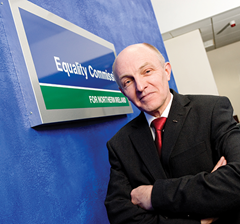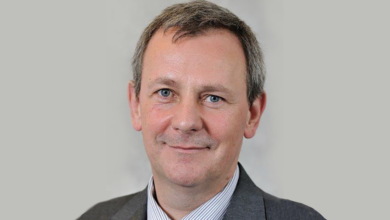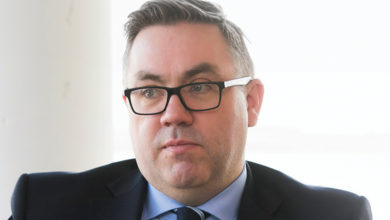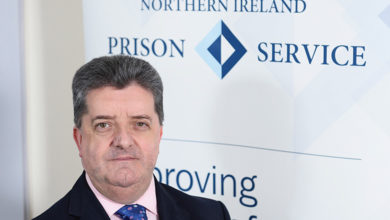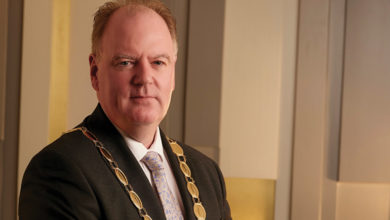Michael Wardlow: moving beyond compliance in equality
 Promoting good practice and encouraging leaders in public service and business to stand up for equality will improve life for us all, Chief Commissioner of the Equality Commission for Northern Ireland Michael Wardlow tells Peter Cheney.
Promoting good practice and encouraging leaders in public service and business to stand up for equality will improve life for us all, Chief Commissioner of the Equality Commission for Northern Ireland Michael Wardlow tells Peter Cheney.
“I would love to see people come forward to join with us in promoting equality of opportunity for all,” Michael Wardlow says, “not just because they see it as a legal requirement but because when inequalities are challenged, it will benefit all of society.”
Wardlow was previously Chief Executive of the Northern Ireland Council for Integrated Education (NICIE) for 15 years and then worked as a self-employed consultant on good relations for three years.
He says that what has most impressed him has been the staff of the organisation “who are really engaged to make this [Northern Ireland] a better place.” If the organisation were a person, it would be “someone who really is an optimist and feels that they can make a positive difference to people’s lives.” he added.
“I’m honoured to be leading such a diverse and experienced board,” he says of the 15 commissioners. “There is a real sense of commitment and partnership; it has allowed us to have some robust conversations about how we might do something but there has been no disagreement about what the end result should be, which is to make a real improvement in the lives of people here. We have a really strong and shared sense of wanting to deliver outcomes and create impact.”
Based on its audit and risk management and performance, he predicts that if the commission were a plc, the shareholders “would be well-pleased.”
The organisation has also recently received silver status in the Investors in People accreditation, only achieved by
1 per cent of participating organisations, and it is now aiming for gold.
Promoting good practice
The commission receives monitoring data from around 4,000 workplaces annually, which covers approximately 70 per cent of the Northern Ireland workforce. “This is an important responsibility, which stands alongside our support to public authorities to assist them in their Section 75 equality and good relations duties, and our work to make sure that places of employment and service provision are free from discrimination.
“In addition, the Equality Commission and Northern Ireland Human Rights Commission jointly promote, protect and monitor the implementation of the UN Convention on the Rights of People with Disabilities, a vital and challenging responsibility.”
He adds: “It can appear at times that equality is only discussed in terms of compliance with legal requirements.
I would argue that compliance is the floor, not the ceiling, and we must move beyond compliance to achieve the society we want.”
And he has found “fantastic models of good practice that move beyond compliance” where organisations adopt equality because they see its value and know that it delivers long-term benefits: “We see these as champions of best practice and really want to encourage them to get out there to talk about this.”
In the past year, the commission has been involved in a range of projects to celebrate best practice. These include establishing the diversity champion category in the Women In Business Awards, and highlighting those private and public sector organisations across Northern Ireland who have been inspirational in their approach to employing disabled people and in providing tailored services in partnership with Employers for Disability and the Department for Employment and Learning.
“We are keen to find ways to showcase the work of those who are dedicated partners in the work to deliver equality.” He offers one such example: “When we launched the results of our attitudes survey, ‘Do You Mean Me?’, last year, we heard from a representative of Shorts Bombardier how an organisation is more effective when attention is paid to equality.
“This year we are developing a range of partnership projects that focus on issues to do with race, sexual orientation, gender and disability issues that reflect the needs and views of both representative groups and individuals.”
Welfare reform is a major focus for the commission as the primary legislation moves through the Assembly. In its response to the Department for Social Development’s equality impact assessment (EQIA), the commission made a number of critical observations on both the process and the potential adverse impacts of the legislation.
In addition to expressing concern that some statistics were outdated, the commission noted that the data were “extremely limited” and the department had taken a “minimalist approach” when assessing the policy impacts.
The commission has expressed its concerns to both the Department for Social Development and the relevant Assembly committees, and will continue to monitor developments.
On a more positive note, he welcomes the very clear interest from the Assembly and the consideration to the issue shown by members, which has included setting up an ad hoc committee.
He believes that MLAs are taking the reform seriously as “many vulnerable people are most likely to be hit by this.”
Wardlow adds: “There can be misunderstanding about the role of Section 75 in policy-making. Public authorities need to pay due regard to promoting equality of opportunity and have regard to good relations. It is a mainstreaming tool that allows for an examination of impacts and also how to mitigate these. It is therefore not a ‘test’ that can be passed or failed. It requires a considered and purposeful approach. And we are there to help government and public authorities in this.”
Priorities
The Equality Commission’s 2012-2015 corporate plan has four strategic objectives: address key inequalities; extend equality practice in workplaces and in the provision of goods and services; challenge discrimination; and deliver effective and efficient services.
As part of its work to address today’s key inequalities, a review is currently being carried out to update previously published data in areas such as:
• educational under-achievement;
• access and availability of health and social care;
• housing and communities;
• employment;
• participation in public life; and
• the impact of prejudice.
The commission’s legislative reform agenda, which contains proposals in the areas of race, disability, gender, the Fair Employment and Treatment Order and age, will be a continued focus to ensure that people in Northern Ireland have improved protection from discrimination.
“We are committed to ensuring our legislation is fit for purpose,” he says. “An example of this would be to seek to have those who are under 18 years of age have appropriate protection in the anticipated age legislation on goods, facilities and services.”
The commission has welcomed the focus on equality in the Programme for Government and will monitor the impact of this. It is also expecting a range of government strategies, including those on race, sexual orientation, childcare and cohesion, sharing and integration. It will seek to both inform and respond to these important initiatives. The commission also wants to see the Cohesion, Sharing and Integration Strategy published by OFMDFM as soon as possible.
Tackling discrimination
In ideological terms, social conservatives often view equality as a “liberalising” concept. Wardlow contends that equality should be important for everyone because discrimination still exists. The ‘Do You Mean Me?’ survey found that one in three people felt that they had been discriminated against and alongside that, one in three also felt that discrimination was justified in some circumstances.
The commission provides advice to around 3,000 people each year to help them resolve their concerns about discrimination. On average, around 10 per cent of these will seek the commission’s support to achieve a legal remedy and the commission will provide a legal assistance to a number of these (85 in 2011-2012) in line with its strategic criteria, which include clarifying the law and highlighting how equality law protects people against discrimination and harassment.
Wardlow notes that the commission assistance of the Lennon vs Department for Regional Development case was to highlight that fair employment legislation applies to all posts, including public appointments.
It also wants to hear about all experiences of discrimination to inform the development of all of its work and is making particular efforts to increase reporting amongst lesbian, gay, bisexual and transgendered people, and those who have been discriminated against because of their age.
“Our services are so much more than assisting cases to court. If that was the only thing we did, we would not be able to make the very real impact that we do,” he explains, “but if alongside our compliance work we’re supporting the development of good practice, then I believe the incidence of discrimination will fall.”
Wardlow adds: “There will be equality matters such as sexual orientation rights that could appear to clash with views or beliefs on morality. We should all should be sensitive to personally held views on what may be perceived to be issues of faith and indeed should protect individuals from religious discrimination. But we also must understand that the right of a person to be protected from discrimination because of their religion cannot mean that the rights of others are diminished. The commission is here to help employers, service providers and public bodies to understand their responsibilities.
“We also want to be part of a wider conversation with policy-makers, faith organisations and representative organisations to seek to better understand the issues.”
Equality, in his view, is not an agenda. “Once you say it’s an agenda, it’s owned by somebody and it becomes a zero-sum game,” he remarks.
Commenting on the point of view that some unionists perceive that the peace process has delivered more for nationalists than unionists (and that equality is therefore ‘green’), he says: “I would say that equality is for everyone. I do understand why the perception’s out there and can see that there is still a role to work to convince some that equality, in and of itself, is actually a good thing.”
It is put to him that the idea of ‘equality for all’ is highly idealistic, suggesting a good outcome for all of the 1.8 million people who live in Northern Ireland. “If you don’t have an aspiration, there’s no vision and if there’s no vision, you’re not going to go anywhere,” he responds.
“The commission is aware that the experiences of people living here are impacted positively and negatively by the actions and attitudes of others. We are concerned that there are both enduring and emerging inequalities and we are committed to addressing these,” he remarks.
“My first year in office as Chief Commissioner has also been the first year of our new corporate plan, which has the intention to work to improve people’s lives. We are not just looking inwards to achieving this, but also outwards. We want to build new kinds of partnerships, to create increased value from what we do. We can see that there is a growing number of advocates for equality and we want to work with them as well as those who feel the case has still to be made,” he states. “I want this place to be a better place.”
 Equality House
Equality House
7-9 Shaftesbury Square
Belfast, BT2 7DP
Tel: 028 9050 0600
Fax: 028 9024 8687
Email: information@equalityni.org

